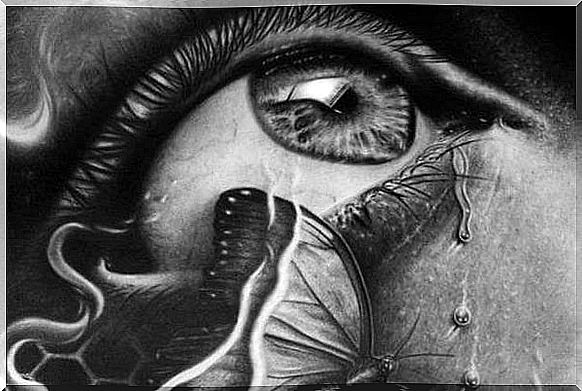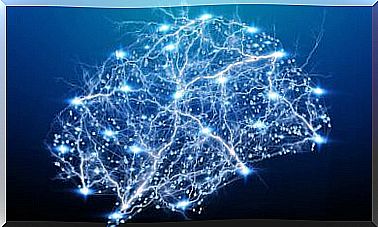“If You Love, You Suffer. If You Don’t Love, You Get Sick , Sigmund Freud

The phrase “If you love, you suffer. If you don’t love, you get sick ”is one of Sigmund Freud’s most popular. It is included in his “Introduction to Narcissism” and, currently, we see it circulating on all social networks. Many think that its meaning is romantic, but the truth is that it is the result of a whole theory about it.
Sigmund Freud and psychoanalysis have been called into question countless times. The most frequent criticism indicates that it is a “non-scientific” body of theory. Still, most of Freud’s theory has influenced all of the human sciences, including “hard” disciplines like psychiatry.
Be that as it may, the truth is that few discuss the importance of love in the development of the human being. From the moment we open our eyes to the world, we suffer a lack: the lack of the other. There is no way to survive or grow, if there is no other that makes it possible.
This, in other words, means that if there is not even a minimum of love at the beginning of our life, it becomes unviable. Someone has to attend to our needs, or else we die.
The human being is, forever and ever, a being in need. Lacking. A void inhabits us that is impossible to fill, although sometimes we come to believe that this is not the case. This is because, forever and ever, we have been condemned to an insurmountable loneliness. As much as we manage to establish intimate and loving bonds, the reality is that we are born, live and die essentially alone.
If you love, you suffer
Multiple forms of suffering come into play in love, ranging from loving and not being loved, to discovering that love does not solve everything. One way or another, there is no way to love without suffering. Why should it be so? Why doesn’t love just lead to happiness? Isn’t it a “masochistic” position to think that way?

Falling in love is a kind of “wonderful anger,” in which all the meanings of the world are temporarily altered. It is very obsessive, but, at the same time, it prints a vitality that is difficult to achieve through other experiences. Falling in love is excruciating and delicious at the same time. It is very well represented in “Love in the time of cholera”, where it is stated that “the symptoms of love are very similar to those of cholera.”
Yes. To fall in love is to suffer with pleasure. Suffering because that person is slow to arrive, feeling like you die when you suspect that everything may end. Knowing that you would be able to go to hell, if it is in the company of that person who stole your heart. The emotion of loving and being loved alternates with the fear of losing the one you love. The enthusiasm for the meeting, with the insidious doubts about the disagreements.
Once that vibrant phase of infatuation ends, you experience a kind of grief at the beginning. “Something” is gone, “something” is not like before. You know that you continue to love that person, but also that that love has limits. You suffer then because you have to say goodbye to the illusion of that romantic and eternal love.
If you don’t love, you get sick
When a person has difficulty establishing love bonds with others, they become very vulnerable emotionally and mentally. Hermeticism, obsessive self-closure, difficulty in communicating what one feels or thinks to others, are signs that things are not going the right way.

The self is ill. If only what has to do with oneself is important and there are great difficulties in recognizing what affects others, there are plenty of reasons to think that the person is trapped in his own narcissism. But this is not a moral or ethically reprehensible issue. Rather, it is a disturbing sign, indicating that the person has become ill or is going to become ill.
In matters of the mind, the question of time always counts a lot. We all have stages in which we are reluctant to contact others or phases in which we need to be alone with ourselves. But when that becomes a relatively permanent pattern, there are problems. The main one is that while the face is narcissism, the stamp is a strong detachment from life and an inclination to everything that represents death.
It is as if one becomes ill with oneself. This excessive focus on one’s own self, sooner or later, translates into anguish, an obsession. It also translates into an unproductive life with very little meaning. Or in a scheme in which others are just instruments, things that serve our purposes. Under these conditions, the possibility of achieving something that we all seek is increasingly removed from us: to achieve inner peace.

The final counterpoint
As a counterpoint to Freudian theory, Buddhist psychology makes a different argument regarding love and love. According to Buddhism, love is the aspiration and desire that all beings have happiness and its causes. In this way, unconditionally wishing everyone happiness, we establish a healthier and healthier relationship in which attachment and need do not come into play. Contrary to Freudian theory, Buddhist theories defend that we are whole beings and not empty. And precisely through the experience of genuine love, we experience part of our fullness.
Regarding the lack of love and getting sick, Buddhism affirms that the lack of love leads to selfishness, and this comes from the ego. Selfish behavior would facilitate human suffering, since we ignore our true loving essence and can lead us to commit negative acts seeking happiness.
Therefore, the lack of love that leads us to suffering could also make us sick by becoming selfish beings. James Penerbacker, a psychologist and researcher at the University of Texas, states that: “statistics show that suicide bombers, before taking their own lives, had used the words ‘I’, ‘mine’, ‘me’ and ‘me’ in their writing. twice as much as usual, and the pronoun ‘we’ seldom or not at all ”. So, instead of clinging to our ego, better to meditate on genuine love. Love does not imply suffering, but liberation. It involves releasing an essential bond that unites us all equally.









